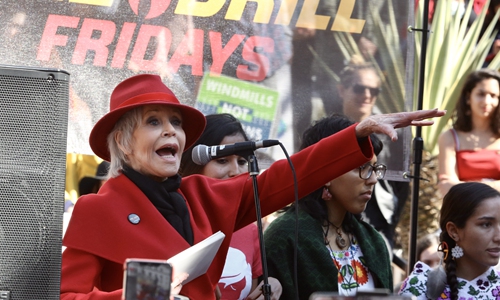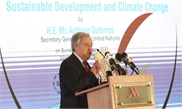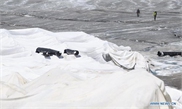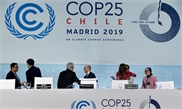Rainforest Alliance aims to help ethical growers get climate-smart
The Rainforest Alliance will bolster its food certification scheme to ensure growers and brands make better use of technology to tackle climate change, respect human rights and invest in sustainable farming, the green group said.

"Sustainability certification has changed dramatically over the last five to 10 years - there are now much bigger challenges," said Ruth Rennie, director of standards and assurance at the Rainforest Alliance, a US-based nonprofit.
"Climate change is pushing new challenges our way all the time. Social inequalities are rising in the world. We need to be looking at those things constantly," she told the Thomson Reuters Foundation.
To adapt to climate change, certified farmers will assess the risks they face, put in place emergency measures to cope with floods and drought, and consider climate resilience in their choice of crops, she added.
Consumers are demanding more information on where their products come from, and expect brands to show they are having a positive environmental and social impact, Rennie said.
Globally, more than 2 million farmers now use the Alliance's certification schemes, which help to ensure commodities are not linked to deforestation and can be tracked from grower to buyer.
Producers must also adopt good agricultural practices and water management, and have systems to address issues like child and forced labor and workers' rights.
More than 5,000 food buyers and companies source ingredients from the schemes, including Nestle, Unilever, Hershey Co, Walmart, Dole and Chiquita. The revised standard, which will replace existing schemes and use the Alliance's green frog seal, was developed over two years in consultation with more than 1,000 people in nearly 50 countries.
It will shift away from a "pass-fail" system using auditors toward a "continuous improvement" model that identifies and tackles future risks, Rennie said.
Members will have to comply with strengthened criteria on forest protection and social issues, while also looking at where climate and human rights risks occur in their supply chains and creating a plan to overcome them, she said.
Better use of technology and data is a critical part of the new scheme, with members expected to use monitoring tools to pinpoint risks like deforestation as they arise, she added.
The new program will also introduce a mandatory premium or investment to support food producers' sustainability efforts.
"We can't just expect farmers to meet all the costs to get certified, with no real return," Rennie said.

Movie star Jane Fonda speaks during the Fire Drill Fridays rally, calling for action to address climate change at Los Angeles City Hall on, February 7. Photo: Xinhua
International certification bodies the Rainforest Alliance and UTZ merged in 2018, and provide ethical labeling for coffee, tea, cocoa and bananas, to meet growing consumer demand."Sustainability certification has changed dramatically over the last five to 10 years - there are now much bigger challenges," said Ruth Rennie, director of standards and assurance at the Rainforest Alliance, a US-based nonprofit.
"Climate change is pushing new challenges our way all the time. Social inequalities are rising in the world. We need to be looking at those things constantly," she told the Thomson Reuters Foundation.
To adapt to climate change, certified farmers will assess the risks they face, put in place emergency measures to cope with floods and drought, and consider climate resilience in their choice of crops, she added.
Consumers are demanding more information on where their products come from, and expect brands to show they are having a positive environmental and social impact, Rennie said.
Globally, more than 2 million farmers now use the Alliance's certification schemes, which help to ensure commodities are not linked to deforestation and can be tracked from grower to buyer.
Producers must also adopt good agricultural practices and water management, and have systems to address issues like child and forced labor and workers' rights.
More than 5,000 food buyers and companies source ingredients from the schemes, including Nestle, Unilever, Hershey Co, Walmart, Dole and Chiquita. The revised standard, which will replace existing schemes and use the Alliance's green frog seal, was developed over two years in consultation with more than 1,000 people in nearly 50 countries.
It will shift away from a "pass-fail" system using auditors toward a "continuous improvement" model that identifies and tackles future risks, Rennie said.
Members will have to comply with strengthened criteria on forest protection and social issues, while also looking at where climate and human rights risks occur in their supply chains and creating a plan to overcome them, she said.
Better use of technology and data is a critical part of the new scheme, with members expected to use monitoring tools to pinpoint risks like deforestation as they arise, she added.
The new program will also introduce a mandatory premium or investment to support food producers' sustainability efforts.
"We can't just expect farmers to meet all the costs to get certified, with no real return," Rennie said.



